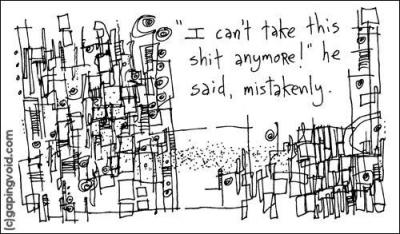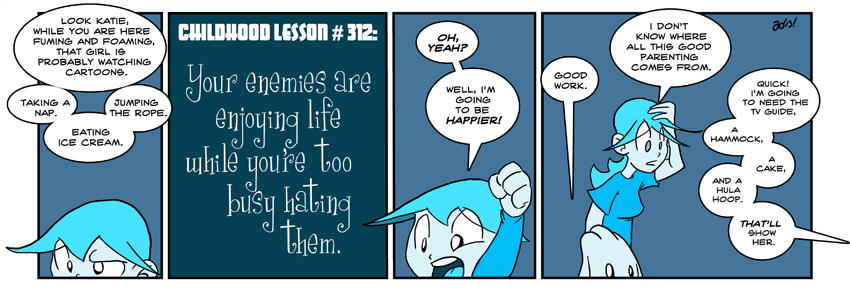This post is going to mix the poetry with something very practical: how to compost. This is an adaptation of the way we do it at home. If this is too long, just scroll down for Juliet Wilson's gorgeous poem .
You need:
-A house with a garden or something of the sort. A front garden is not enough: you need a space that is either not open, or not very near a door or a window. The reason is that compost smells a bit (done properly, it really smells just a bit). You also need a bit of privacy because it is going to attract every species of bug in the neighbourhood. My compost has, at the very least: three types of flies (and I assume, their eggs), one or two types of ants, two types of crawlies with names I don't know, and slugs. None of this is going to get into your house, as the food supply is much steadier and yummier where they are, but you don't want passers-by, neighbours, etc. thinking that you live in a sty.
-Two compost bins. You can use ordinary rubbish bin as long as they are big (let's say, three or four feet high) and with a lid that closes well. In some garden shops, you can be bin especifically designed to make compost in them. If you are improvising, all you need is a lid on top (to keep the contents hot, and the smells in; the final result is much better quality) and some opening at the bottom; you could drill holes near the base. I will call the compost bins the November and the February bins.
What to do:
-Throw on your compost bins all the organic waste from the house except:
-oily stuff, because it doesn't rot. It goes rancid. Fried food is OK.
-Paper, because it takes forever and ever to decompose. Tea bags are OK.
-Anything with an animal origin is compostable but smells really, truly awful. No meat, fish, or dairy. Egg shells must be crushed, otherwise they don't mix with everything else. -Excrements from humans and carnivores. Droppings of herbivores (pets) are OK.
-Anything with a lot of salt on it. For example, salted nuts, or pistachio shells.
You can add garden waste, except twigs and branches. Garden waste doesn’t rot as nicely as kitchen waste so it’s good to have both.
-When you throw something with long hard fibers, like melon shells or celery stalks, cut it up in little pieces first. Small things compost faster. I don't like to see in my bin anything bigger than a walnut.
-Keep the area near the bin very clean to minimise smells.
-Never use any sort of pesticide on your compost. The bugs in there are doing their job, and if you follow reasonable cleanliness they are not a health hazard to people or to your home. The only thing in the compost that you don't want there is the (very occasional) slug, because they will eat up all your greenery later. It is much easier to crush a slug into the soil than to bother with poisons.
The composting process:
The most important thing is that after putting compost on the ground, you need lots of water so that the plants don’t die of “overeating”. This means that composting time is autumn to winter, the rainy months. Here you have a handy calendar:
AUGUST: last time to add anything into your November bin. This way, everything will have time to mature for a few months.
EARLY NOVEMBER: empty the contents of your November bin on your plants. It must NOT smells really bad. If it smells fermenting, sour, rotten, it is not ready yet. Proper compost smells sweet and earthy. It is not a smell you’d use as perfume, but it’s not that bad.
LATER IN NOVEMBER: when your November bin is empty, don’t add anything more to your February bin.
FEBRUARY: empty the February bin if it is mature.
Homemade compost is not just good for the plants. You will see how many birds are attracted to your garden because of the bugs.
And now, the poem:
Nothing ends - all transforms,changes direction like a river bends. Day becomes night, bodies decompose to feed roses, freeing spirits to roam.When the earth dies (whether at our hands or after peaceful milleniaorbiting a dying star) atoms fromAmazonian rainforests will becomepart of some magnificent beings we cannot imagine on a helium atmosphered planet so far away it seems beyond the end of space.^^^^^^^^^^^^^^^^^^^^^^^^^^^^^^^^^^^^^^^^^^^^
Este post va a mezclar la poesía con algo muy práctico: cómo elaborar abono casero. Ésta es una adaptación de la forma en que lo hacemos en mi casa. Si no tienes ganas de leer tanto, al final del post está el precioso poema de Juliet Wilson.
Necesitas:
- una casa con un jardín o algo parecido. Que no dé a la fachada: necesitas un espacio que o esté relativamente cerrado, o que no ande muy cerca de una puerta o de una ventana. La razón es que el abono inmaduro huele un poco (bien hecho, de verdad que no huele mucho). También hae falta que el sitio sea discreto porque vas a atraer a montones de bichos. Nuestro abono tiene, por lo menos: tres tipos de moscas (y asumo que sus huevos y larvas), uno o dos tipos de hormigas, dos tipos de bichos reptantes con nombres que no sé, y babosas. Ninguno de ellos quiere meterse en tu casa, pues el suministro de comida es mucho más constante y más rico donde han llegado, pero no quieres que nadie que pase por allí, ni los vecinos, piensen que vives en una pocilga.
- Dos composteras o cubos para compost (otro nombre para el abono vegetal). Puedes usar un cubo de basura normal si es grande (un metro de alto por lo menos) y con una tapa que cierre bien. En algunas tiendas de jardinería venden composteras, que vienen muy bien porque eliminan al máximo los olores y consigues que el calor interior aumente mucho, pero vamos, en mi casa hemos llegado a usar simplemente bolsas de basura de jardinería (bolsas de plástico muy grandes y muy resistentes). Si estás improvisando, lo único que necesitas es algo grande que tenga tapa por arriba y alguna apertura en el fondo. Puedes hacerle agujeros al cacharro que sea, cerca de la base. De ahora en adelante, voy a llamar a los cubos “el de noviembre” y “ el de febrero”.
- Un cubo en la cocina separado del cubo de la basura normal.
- Una pala para sacar el abono del cubo y repartirlo por el jardín.
Qué hacer:
- Tirar en los cubos toda la basura orgánica de la casa excepto:
- Aceite y grasas, porque no se descomponen, se enrancia. La comida frita sí sirve.
- Papel, porque tarda años en descomponerse. Sirven las bolsitas de té e infusiones.
- Cualquier cosa de origen animal es compostable, pero olerá realmente muy mal y atraerá a bichos más feos y asquerosos (una nidada entera de larvas de mosca es un espectáculo bastante terrorífico). Nada de carne, pescados, o lácteos.
- Las cáscaras de huevo hay que chafarlas, porque si no no se mezclan con lo demás.
- Excrementos de seres humanos y de animales carnívoros. Los de los herbívoros, por ejemplo un conejo que tengas de mascota, sí valen si te empeñas.
- Cualquier cosa con mucha de sal. Por ejemplo, cáscaras de pipas.
- Sirven los restos del jardín, como hojas secas, o restos de podar, pero esas cosas no se descomponen tan bien como los restos de cocina, así que es bueno tener las dos cosas.
Si echas algo con fibras duras y largas, como cáscaras de melón o tallos del apio, córtalo en trocitos primero. Las cosas pequeñas se pudren más rápido. Personalmente, no me gusta echar al cubo nada más grande que una nuez o así.
- Mantén la zona cerca del cubo muy limpia para reducir al mínimo los olores.
- Nunca le eches pesticidas al abono. Los bichos están haciendo su trabajo, y si con un grado de limpieza razonable son inofensivos. Lo único que no conviene es que haya babosas (que solo aparecen de vez en cuando), porque serían capaces de comerse todo el verde de tu jardín. Es mucho más fácil chafar una babosa o partirla en dos con una pala
- un peligro para la salud a poblar o a su hogar. La única cosa en el estiércol vegetal que usted no desea allí es el lingote (muy ocasional), porque comerán encima de todo su greenery más adelante. Es mucho más fácil machacar un lingote en el suelo que incomodar con los venenos.
Cómo abonar:
Lo más importante es que después de abonar, hay que regar abundantemente para que las plantas no se mueran por exceso de abono. Esto significa que el momento adecuado es el otoño y el principio de la primavera, los meses lluviosos (al menos en Andalucía).
Aquí tienes un calendario sencillito:
AGOSTO: última ocasión para echar cualquier cosa en el cubo de noviembre. Así, todo tendrá tiempo para madurar.
PRINCIPIOS DE NOVIEMBRE: vacía el cubo de noviembre echando todo el compost a las plantas. No debe oler mal. Si huele a fermentado, ácido, o a podrido, no está listo todavía. El estiércol vegetal bien hecho huele a tierra, y un poco dulzón. No es un olor que vayas a querer usar de perfume, pero no es desagradable.
MÁS ADELANTE EN NOVIEMBRE: cuando el cubo de noviembre esté vacío, ya no se echa nada más al de febrero.
FEBRERO: vaciar el cubo de febrero, si está maduro. Si resulta que no necesitas tanto estiércol, y tus plantas están preciosas y con una abonada al año te basta, lo puedas guardar en bolsas de plástico, o regalarlo.
El estiércol vegetal hecho en casa no es bueno sólo para las plantas. Verás cuántos pájaros van a tu jardín: es para comerse los bichitos.
Y ahora, el poema:
Nada termina - todo se transforma,
cambiando de dirección como los ríos.
El día se hace noche, los cuerpos se descomponen
para dar de comer a las rosas, liberando espíritus.
Cuando la Tierra muera (ya sea
por nuestra mano o después de milenios de paz
en órbita con una estrella moribunda) átomos
de selva amazónica serán
parte de seres fabulosos
que ni nos imaginamos
en un planeta con la atmósfera de helio, tan lejos
que parece más allá
del final del espacio.

